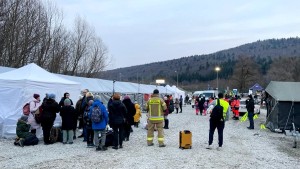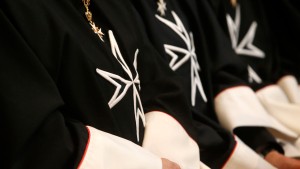What is the ambition of the new constitution of the Order of Malta, promulgated by Pope Francis and which will be known next January? The writer Bertrand Galimard Flavigny, author of a “History of the Order of Malta” (Perrin), answers questions from Aleteia.
“A reform was necessary”, explains to Aleteia Bertrand Galimard Flavigny. However, the members of the Order of Malta fear becoming an NGO like the others. By consecrating the institution as a religious order, does Pope Francis threaten the sovereignty of the Hospitallers? This is the whole point of the new constitution.
Aleteia: The Order of Malta was created in 1048, approved by the Pope in 1113. It is an atypical organization, both a religious order, a sovereign state without territory and a charitable NGO. How was this one-of-a-kind institution born?
Bertrand Galimard Flavigny: To understand the origin of the order and its functioning, we must go back to history. When the crusaders entered Jerusalem in 1099, he already found hospices founded by merchants from Amalfi, and entrusted to monks dressed in black. Among them, a brother Gerard, would have asked Pope Paschal II (1099-1118) to recognize them as an “exempt” religious order, that is to say that it depends only on the pope and that he can elect his own superiors. These hospitable “black monks”, installed in unstable territory, must take up arms like the Templars to protect their hospitals, most of the Crusaders having left.
Around 1948, the Hospitallers resisted an attempt to regroup with the Order of the Holy Sepulchre. In 1961, a new Charter and the election of a Grand Master stabilized the situation.
Territorial sovereignty arrives after the loss of Saint Jean d’Acre: fiercely attached to their independence, the Hospitallers settle in Rhodes by organizing themselves in a sovereign way: they dispense justice, mint money, etc. This situation lasted from 1229 to 1527. Driven out by the Ottomans with the honors of war, they retreated to Malta, a real strategic lock in the middle of the Mediterranean, which Charles V ceded to them, with the agreement of the Pope, in full sovereignty. . There, they made this pebble an uninterrupted pole of resistance to the Turks and the Barbarians until 1798 and the treacherous invasion of the island by General Bonaparte. Malta is a state in its own right, with its ambassadors. The Grand Master poses with the crown closed, thereby indicating that he is fully sovereign, equal to kings.
Then comes a period of wandering until around the 1830s, when the order settles in Rome. In 1879, Leo XIII authorized the new election of a grand master and the order gradually regained its operational independence, making the order a sovereign state. sui generis. Around 1948, the Hospitallers resisted an attempt to regroup with the Order of the Holy Sepulchre. In 1961, a new Charter and the election of a Grand Master stabilized the situation.
A recent crisis, in the years 2016-2017, reveals doctrinal disagreements within the order, and tensions with the authorities of the Church. Pope Francis promulgates a new Constitution on September 3. How does this decision constitute a historic break?
Many parameters are involved in this crisis, and in particular many blunders on both sides, giving rise to divisions and misunderstandings. Even if the decision was taken to dust off the Charter, the Pope decided to break with the historical rules of the sovereignty of the order, by appointing a new lieutenant grand master as well as the members of the sovereign council. We do not yet know the content of the new Charter.
It remains that a reform was necessary, in particular on the requirements of quarters of nobility, on feminization and on internationalization.
The great fear of the members of the order is that it will become an NGO like the others, made up of religious and lay people, whose leaders would be appointed by the pope. It remains that a reform was necessary, in particular on the requirements of quarters of nobility, on feminization and on internationalization. The Pope wants more professed, that is to say religious committed by vows. That said, the order has already evolved: since 1961, there have been “knights in obedience”, recruited among lay knights, and who constitute a kind of third order.
It seems that the will of the Pope is to consecrate the Order above all as a religious order. In other words, as an institution run entirely by religious, who owe it obedience, like all religious.
What could really change is whether the grand master is constitutionally appointed by the Pope, or whether he himself is a cardinal, and not a layman with the rank of cardinal. If the order becomes a non-sovereign religious order, it would not have the freedom of action and the speed to intervene on its own initiative, particularly in the diplomatic arena with States.
By overriding the sovereignty of the order with the appointment of the members of the sovereign council, the Pope broke with the historical principle of election.
However, how could the strengthening of the authority of the Pope on the main orientations of the Order be done at the expense of the autonomy of government of the Order, as with regard to any superior of the congregation, even if it has to be accountable?
Indeed, this is what the new Constitution will tell us. Either there is a suppression of the Hospitallers, or there is maintenance of sovereignty. Simply, by going beyond the sovereignty of the order with the appointment of the members of the sovereign council, the Pope has broken with the historical principle of election. It is possible that the measure was transitory, and that the order returned, the usual operation resumes its course.
A general chapter of the Order is convened on January 25 to endorse the new government. Are other decisions expected? What are its prospects for development after the Pope’s decision?
What may change is access to large loads, which could become more open. The will of the Pope, as I said, is to have more professed, more spirituality. New requirements may be provided for in the community life of religious. There are also pressures from certain national associations to take into consideration: the Germans who are very powerful financially, the Americans who do not have access to high office for lack of quarters of nobility. It is no coincidence, for example, that an American is among the new members of the council appointed by the Pope. One way or another, the internationalization of the Church, which is less and less European, should find its way into the structure of the Order of Malta.
Interview by Philippe de Saint-Germain.


